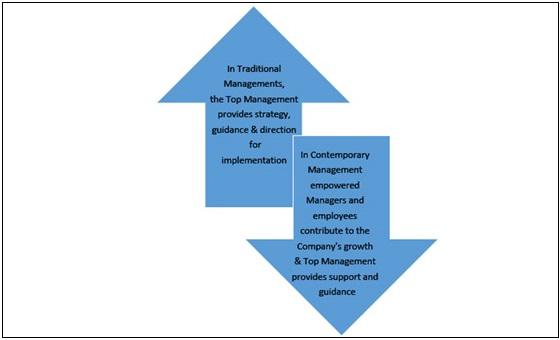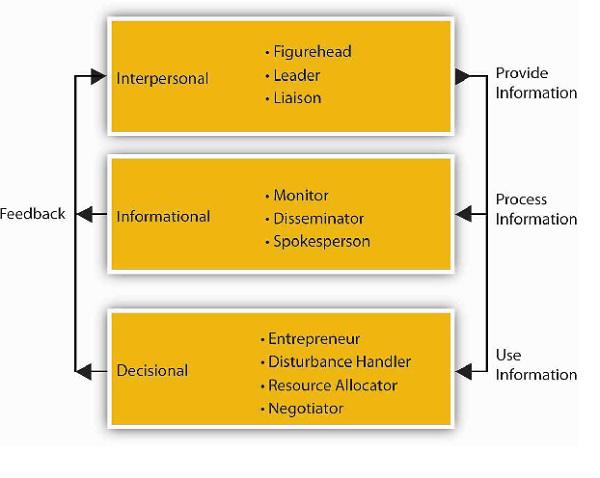Management Principles - Role of Managers
Every organization has ‘Managers’ who are entrusted with the responsibility of guiding and directing the organization to achieve its goals.

Managers administer and coordinate resources effectively and efficiently to channelize their energy towards successful accomplishment of the goals of the organization. Managers are required in all the activities of organizations. Their expertise is vital across departments throughout the organization.
Role of Managers
Managers are the primary force in an organization's growth and expansion. Larger organizations are particularly complex due to their size, process, people and nature of business. However, organizations need to be a cohesive whole encompassing every employee and their talent, directing them towards achieving the set business goals. This is an extremely challenging endeavor, and requires highly effective managers having evolved people management and communication skills.
The Top Management
The top level executives direct the organization to achieve its objectives and are instrumental in creating the vision and mission of the organization. They are the strategic think-tank of the organization.
Senior Management
The General Manager is responsible for all aspects of a company. He is accountable for managing the P&L (Profit & Loss) statement of the company. General managers usually report to the company board or top executives and take directions from them to direct the business.
The Functional Manager is responsible for a single organizational unit or department within a company or organization. He in turn is assisted by a Supervisor or groups of managers within his unit/department. He is responsible for the department’s profitability and success.
Line and Staff Managers
Line Managers are directly responsible for managing a single employee or a group of employees. They are also directly accountable for the service or product line of the company. For example, a line manager at Toyota is responsible for the manufacturing, stocking, marketing, and profitability of the Corolla product line.
Staff Managers often oversee other employees or subordinates in an organization and generally head revenue consuming or support departments to provide the line managers with information and advice.
Project Managers
Every organization has multiple projects running simultaneously through its life cycle. A project manager is primarily accountable for leading a project from its inception to completion. He plans and organizes the resources required to complete the project. He will also define the project goals and objectives and decide how and at what intervals the project deliverables will be completed.
The Changing Roles of Management and Managers
Every organization has three primary interpersonal roles that are concerned with interpersonal relationships. The manager in the figurehead role represents the organization in all matters of formality. The top-level manager represents the company legally and socially to the outside world that the organization interacts with.
In the supervisory role, the manager represents his team to the higher management. He acts as a liaison between the higher management and his team. He also maintains contact with his peers outside the organization.

Mintzberg's Set of Ten Roles
Professor Henry Mintzberg, a great management researcher, after studying managers for several weeks concluded that, to meet the many demands of performing their functions, managers assume multiple roles.
He propounded that the role is an organized set of behaviors. He identified the following ten roles common to the work of all managers. These roles have been split into three groups as illustrated in the following figure.

Interpersonal Role
Figurehead − Has social, ceremonial and legal responsibilities.
Leader − Provides leadership and direction.
Liaison − Networks and communicates with internal and external contacts.
Informational Role
Monitor − Seeks out information related to your organization and industry, and monitors internal teams in terms of both their productivity and well-being.
Disseminator − Communicates potentially useful information internally.
Spokesperson − Represents and speaks for the organization and transmits information about the organization and its goals to the people outside it.
Decisional Role
Entrepreneur − Creates and controls change within the organization - solving problems, generating new ideas, and implementing them.
Disturbance Handler − Resolves and manages unexpected roadblocks.
Resource Allocator − Allocates funds, assigning staff and other organizational resources.
Negotiator − Involved in direct important negotiations within the team, department, or organization.
Managerial Skills
Henri Fayol, a famous management theorist also called as the Father of Modern Management, identified three basic managerial skills - technical skill, human skill and conceptual skill.
Technical Skill
Knowledge and skills used to perform specific tasks. Accountants, engineers, surgeons all have their specialized technical skills necessary for their respective professions. Managers, especially at the lower and middle levels, need technical skills for effective task performance.
Technical skills are important especially for first line managers, who spend much of their time training subordinates and supervising their work-related problems.
Human Skill
Ability to work with, understand, and motivate other people as individuals or in groups. According to Management theorist Mintzberg, the top (and middle) managers spend their time: 59 percent in meetings, 6 percent on the phone, and 3 percent on tours.
Ability to work with others and get co-operation from people in the work group. For example, knowing what to do and being able to communicate ideas and beliefs to others and understanding what thoughts others are trying to convey to the manager.
Conceptual Skill
Ability to visualize the enterprise as a whole, to envision all the functions involved in a given situation or circumstance, to understand how its parts depend on one another, and anticipate how a change in any of its parts will affect the whole.
Creativity, broad knowledge and ability to conceive abstract ideas. For example, the managing director of a telecom company visualizes the importance of better service for its clients which ultimately helps attract a vast number of clients and an unexpected increase in its subscriber base and profits.
Other Managerial Skills
Besides the skills discussed above, there are two other skills that a manager should possess, namely diagnostic skill and analytical skill.
Diagnostic Skill − Diagnose a problem in the organization by studying its symptoms. For example, a particular division may be suffering from high turnover. With the help of diagnostic skill, the manager may find out that the division’s supervisor has poor human skill in dealing with employees. This problem might then be solved by transferring or training the supervisor.
Analytical Skill − Ability to identify the vital or basic elements in a given situation, evaluate their interdependence, and decide which ones should receive the most attention. This skill enables the manager to determine possible strategies and to select the most appropriate one for the situation.
For example, when adding a new product to the existing product line, a manager may analyze the advantages and risks in doing so and make a recommendation to the board of directors, who make the final decision.
Diagnostic skill enables managers to understand a situation, whereas analytical skill helps determine what to do in a given situation.





